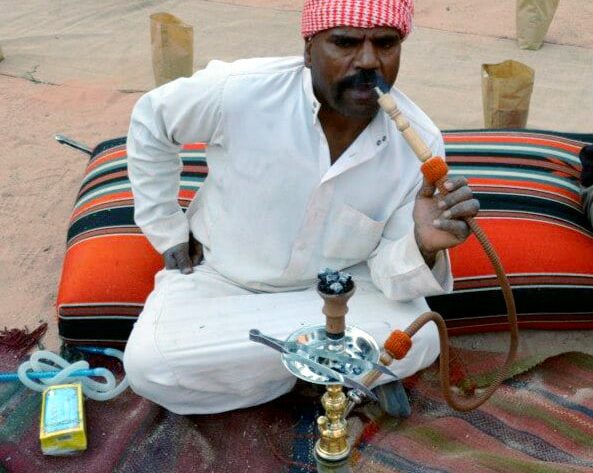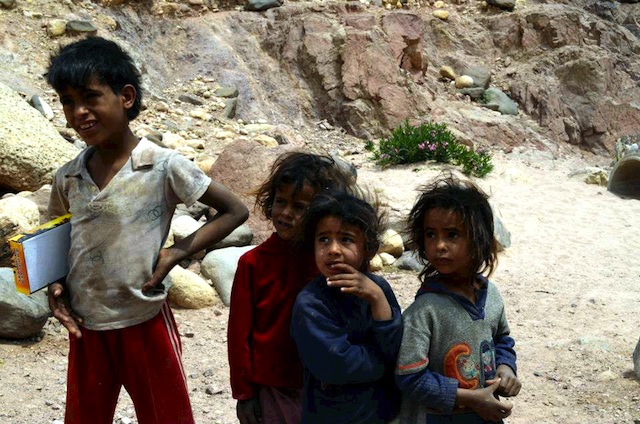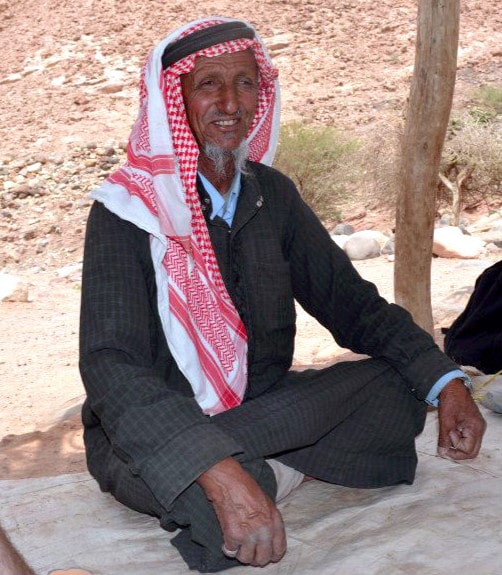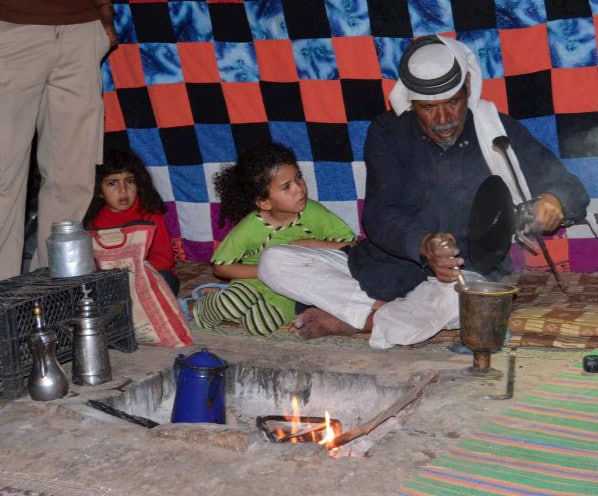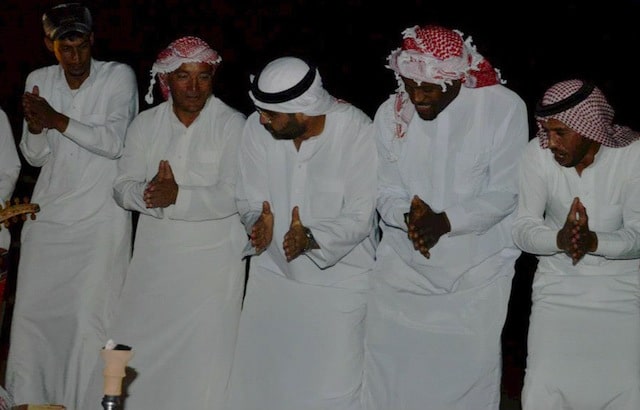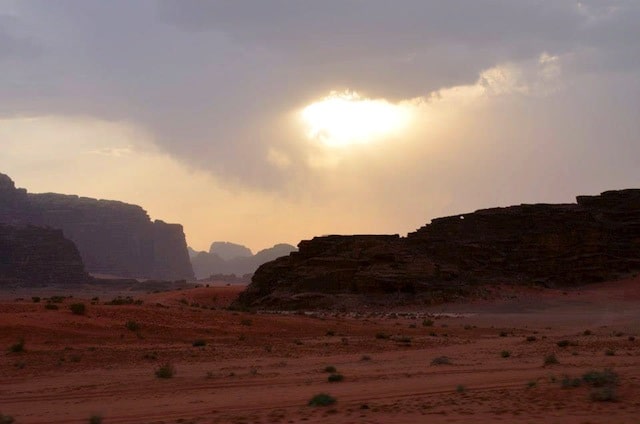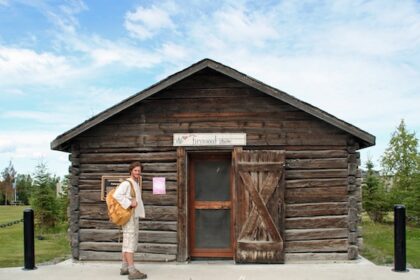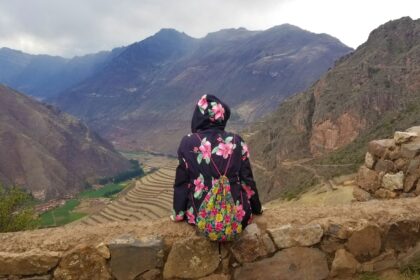Indigenous culture is often a curiosity for outsiders, one we often want to know more about but which we have a hard time relating to once we do in. In my opinion, this is often because people are educating themselves through reading or listening instead of immersing.
In Jordan, I was given the opportunity to truly get to know Bedouin culture, which has a strong focus on strengthening relationships. These people aren’t concerned about money; in fact, they think it’s dirty. Instead, their rituals and traditions revolve around forming healthy and helpful relationships with each other and the land.
First Encounters
My first encounter with the Bedouin community comes in Feynan, one of the few places in Jordan where authentic Bedouin culture still exists. Toward the end of a beautiful but arduous hike from Rumanna Camp to the Feynan Ecolodge through the Dana Biosphere Reserve, I begin to see numerous black Bedouin tents woven out of goat hair. One of the men from the tents notices my flushed face and shirt soaked in sweat and extends an invitation.
“He wants to know if you’d like some goat’s milk,” translates my local guide, Ibrahim.
We’re lead by the man, whose name is Saladin*, to a shaded outdoor area with cushions and pillows. We take a seat as his wife comes out with a giant bowl of thick white liquid for us to pass around the circle. The milk is thick and slightly sour, although as I sip I can feel my energy levels rising. This is not only my first taste of goat’s milk, but also Bedouin hospitality.
A Taste Of Bedouin Coffee Culture
As Feynan Ecolodge, the destination of my hike, is not only committed to helping the environment but also the local community, they offer a range of experiences to guests that allow them a glimpse into this culture. Some of these include spending the day with a shepherd; learning how to make bread, weave goat hair and apply kohl eyeliner; sunset walks led by Bedouins; and becoming acquainted with the rich coffee culture.
This is how I find myself at the home of Adnan*, a local Bedouin employed by the hotel who brings me to his home for some coffee. The goat hair tent is spacious, and once again the guests are seated in a circle on cushions in front of Adnan’s father. Adnan speaks English, and I’m told that in Bedouin culture both friends and strangers are always welcome. In fact, Bedouins begin brewing coffee early in the morning to make sure they’re prepared for unexpected visitors.
Adnan’s father roasts the coffee beans in a pan over the fire. From there, he boils the water while also grinding the coffee with a mortar and pestle. As he grinds, he creates a rhythm that sounds like a song with a distinct beat, which I’m told is what lets others in the area know coffee is being brewed and they can come over to enjoy some. Because there is no doorbell, it is customary for visitors to cough as they approach.
Bedouin culture takes receiving guests to another level, as it is customary to allow guests — whether friends or strangers — to stay as long as they please. No questions are asked by the host for up to three days; however, on the fourth day the hosts are allowed to ask you your name and what you want, but not before.
When the coffee is finished Adnan’s father takes a sip. It is customary for the one who made the coffee to be the first to taste it, to show guests it is tasty and okay to drink. From there, a few cups are passed around to the group to share.
“Each person is allowed up to three cups,” explains Adnan. “Cup one is for the guest, cup two is for the mood and cup three is for the sword.”
When Adnan gets to me I inhale the liquid of the cup, taking in the steamy heat and spicy aromas. Sure enough, the coffee tastes deliciously bitter yet sweet with a touch of cardamon. While freshly brewed coffee is always a treat, this cup is particularly special as it is more than just a drink to these people, it’s a way of life.
In fact, coffee isn’t just about hospitality, it’s also a big part of negotiation in Bedouin culture. When Bedouins do business, negotiate or discuss marriage coffee is the vehicle for the discussion. For instance, if a man wants to marry a women he will go to the house of her family for permission. The answer comes through the coffee, with either the entire family drinking a cup together or nobody taking a sip, no verbal communication needed.
Traditional Bedouin Camping
While up until now I’ve been privy to a series of encounters with Bedouin families, I opt for an immersive experience at Wadi Rum by staying at a Bedouin camp. I arrive at Captain’s Desert Camp at night, walking into a whimsical outdoor world of paper lanterns which illuminate the property’s paths. My room is a spacious goat hair tent, lit only by candlelight.
Video taken at the Captains Desert Camp (dark but gives a sense of the music)
From my room I can hear music, the sounds of a lute (pronounced OOD) — a plucked string instrument with a neck and deep round back — tableh drums, and people singing. As I make my way to the center of the grounds I see the Bedouins are singing around a fire and smoking some fragrant apple shisha.
What begins as a calm sing-a-long soon escalates into a full-on dance party. The energy is high, as everyone forms a circle, holding hands and kicking out their legs as they laugh and run. Soon, the Bedouins begin picking guests out one-by-one to join them in the center of the circle for a dance off. While I can be shy when it comes to public speaking, I am overconfident when it comes to dancing. Once in the circle, however, I’m pleasantly surprised when one of the men gives me a run for my money, breaking out moves I’ve never seen before (some of which I wasn’t sure were physically possible).
Not only are the Bedouins desert-dwellers and traditionalists, they also know how to let loose and have a good time. And while I have a hard time believing Bedouins who around running tourist camps sit around their goat hair tents in the hot desert having dance parties on a regular basis, it opened my eyes to the reality that these native peoples didn’t have to be viewed as some kind of mysterious entity. They had their particular traditions and their way of life, but many of them also had jobs in tourism and in the village, carried iPhones and went to school. They were a group of people who adapted to living off the desert land without the need for riches, but still wanted to enjoy life. And after my time getting to know this culture, I can honestly say I not only learned about them, I learned from them.
Essential Information
For travelers to Jordan wanting to have a similar experience, here is some essential information and recommendations:
Getting In
The national airline of Jordan is Royal Jordanian, although there are over 20 international carriers that fly into the Queen Alia International Airport in Amman. Upon arrival, all nationalities are required to purchase a tourist visa for 20 Jordanian Dinars (about $30).
Getting Around
While public buses can take you cheaply along major routes, for example, between Wadi Rum and Aqaba, the country is small enough that using taxis to get around — even for long distances — is a convenient and affordable option. Moreover, to be able to take your time and enjoy the many scenic drives Jordan has to offer, renting a car can be worthwhile.
Local Guide Services
Ibrahim El-Wahsh was my guide throughout the two weeks I traveled around Jordan, and I highly recommend him. Not only is he fun-loving, comical, and knowledgeable, he’s well-connected allowing for any travel issues to be quickly sorted out. His contact information is [email protected] and +962 7 95915879.
Guided Hikes
Adventure Jordan is a great company for trekking in Jordan, especially for the those walking to hike to Petra. You can contact them at [email protected].
Accommodations Mentioned Above
Rummana Camp- Contact the tourism board at [email protected] or [email protected]
Feynan Ecolodge
Captain’s Desert Camp
Have you experienced Bedouin culture in Jordan?
Jessica Festa
Latest posts by Jessica Festa (see all)
- A Culturally-Immersive Adventure In Mongolia’s Altai Mountains - Jul 8, 2023
- This Recipe Sharing Platform Supports Women In The Culinary Industry (Labneh Recipe Included!) - Nov 5, 2020
- Hiking The Mohare Danda Community Eco-Trek In Nepal - Jun 3, 2020
- 6 Important Questions For Choosing A Responsible Yoga Retreat - May 18, 2020
- How To Create & Grow A Profitable Blogging Business (Ethically) - Jan 18, 2020

